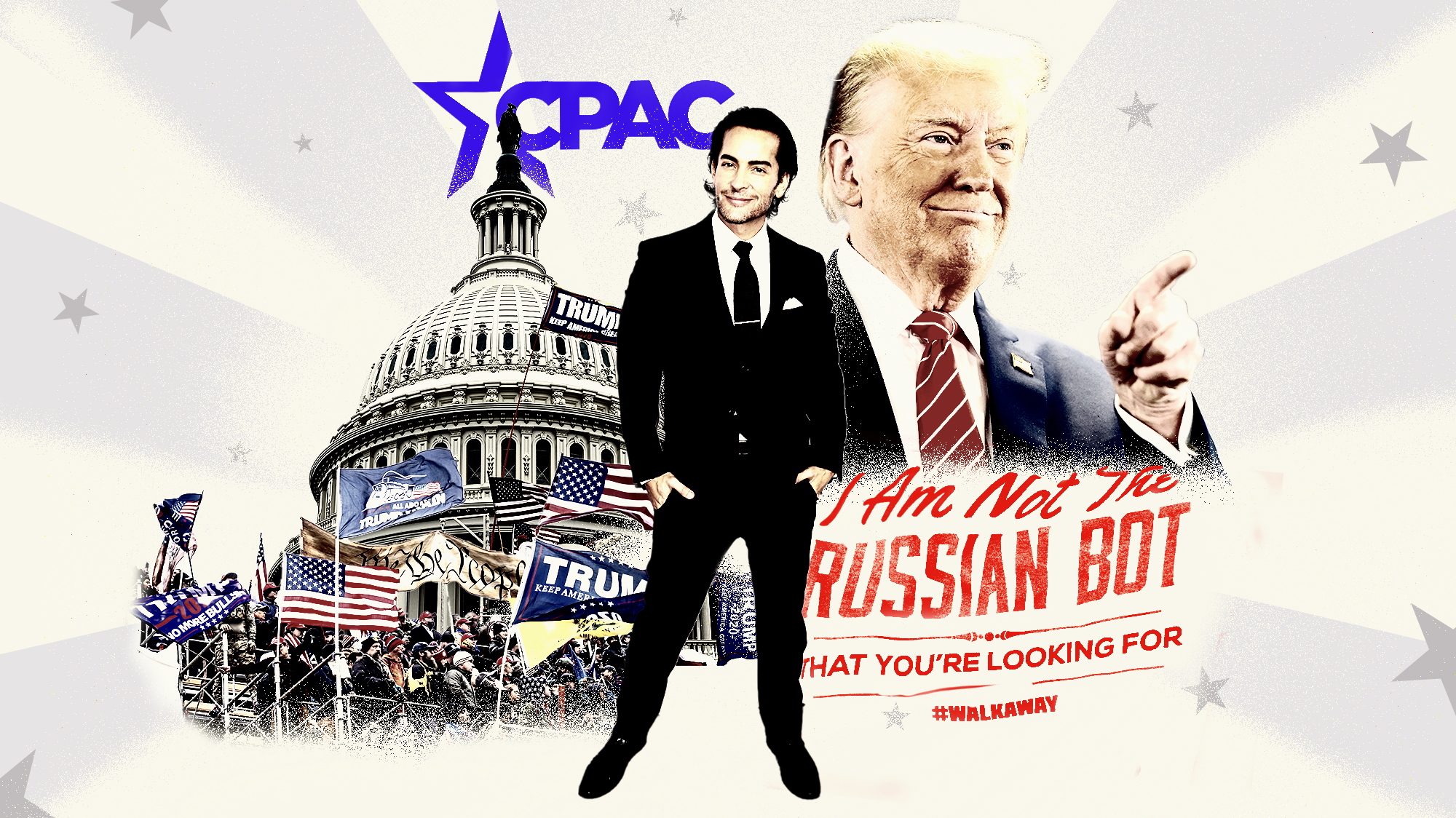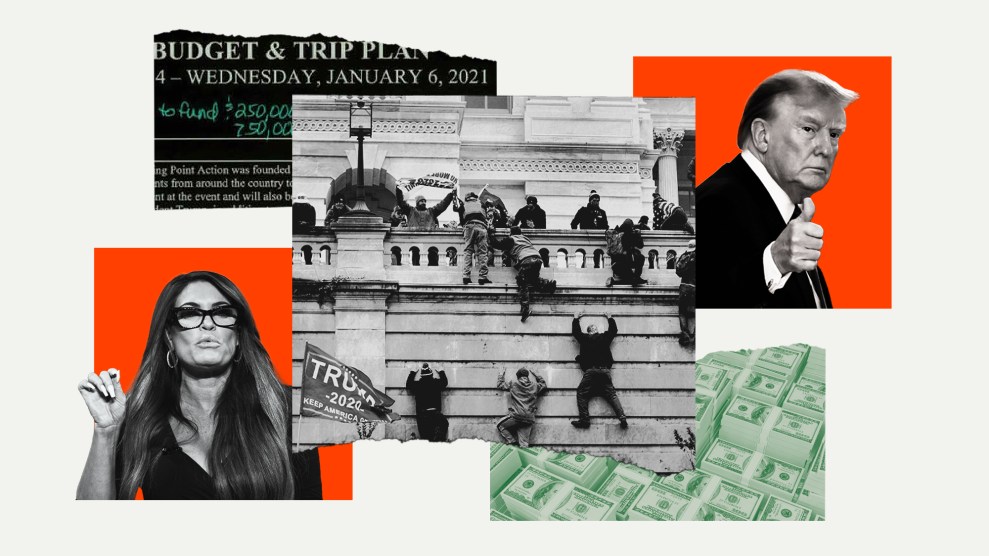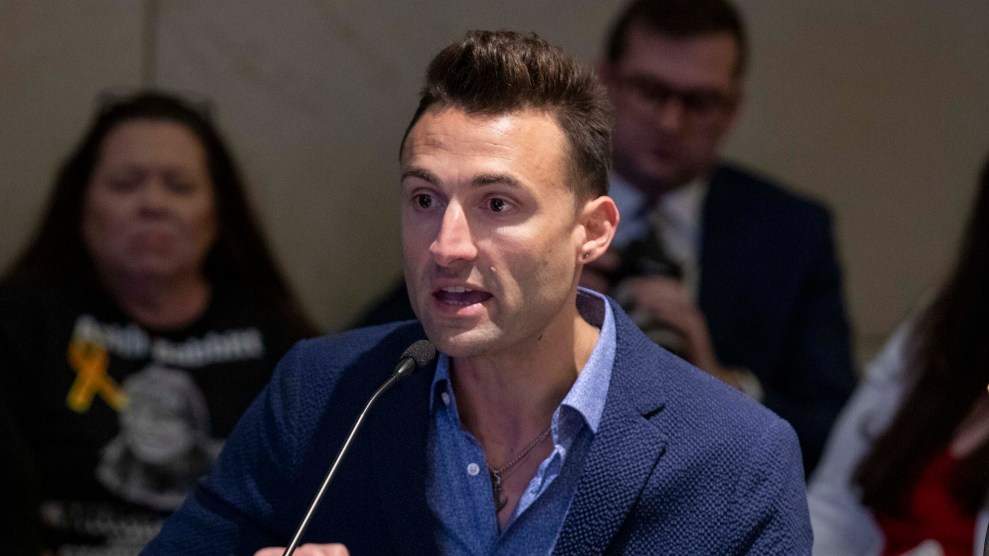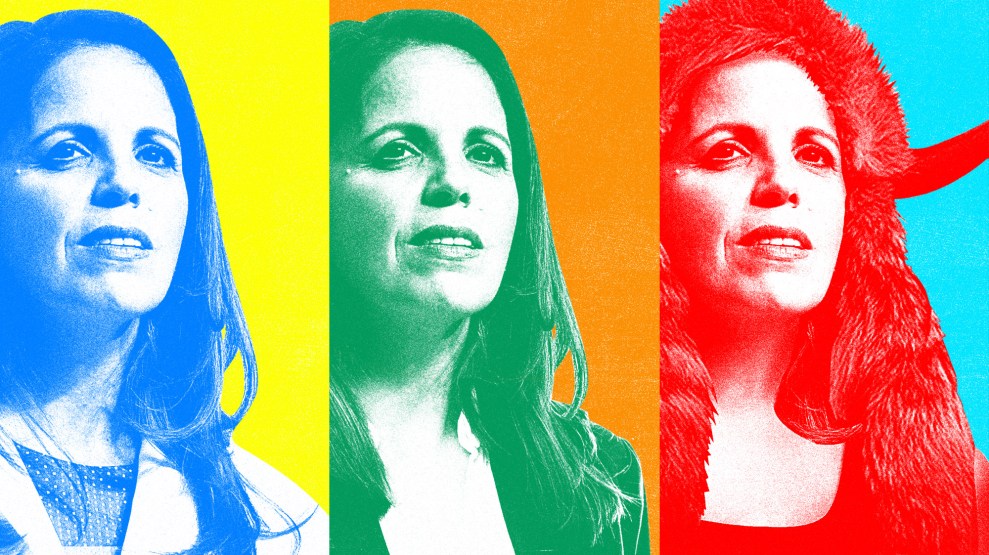At the New Hampshire GOP leadership summit in October, former presidential hopeful Vivek Ramaswamy made a bold promise. If elected, he would pardon participants in the January 6 riot at the US Capitol who he claimed were “targets of politicized federal prosecutions.” The pledge came in response to a question from an audience member with some skin in the game: conservative influencer Brandon Straka. In September 2021, Straka pleaded guilty to one misdemeanor count of engaging in disorderly and disruptive conduct after being part of the mob of rioters outside the Capitol.
“I did not enter the Capitol on January 6. I did not commit any violence, vandalism, theft or destruction,” Straka told Ramaswamy. He’d been prosecuted, he claimed, because of the success of his #WalkAway Campaign, which tries to convince liberals to leave the Democratic Party. “My life was torn apart by the United States Department of Justice and the FBI. The majority of my case was a complete and total lie. I was put in a position where I had to take a plea deal as opposed to going to trial, and potentially facing years in prison for things I did not do.”
Straka has been spinning this version of history ever since he left home detention in early 2022. His social media feeds and public appearances like the one in New Hampshire brim with commentary alleging his prosecution was part of a liberal conspiracy designed to silence him. “The left coordinated a massive effort to take me out that included the FBI, the DOJ, Facebook, Twitter, Google, Soros-funded lawfare, the entire Democrat Marxist state media, antifa, and more,” he tweeted in December 2023.
He claims he was forced to plead guilty because he couldn’t get a fair trial in DC, tweeting in August, for instance, that “Saying that a conviction of a Trump supporter by a DC jury is proof of guilt is no different than saying an all white jury in 1935 Mississippi convicting a black man is proof of his guilt.”
But there is a voluminous record— including court records, texts and depositions obtained by the House January 6 committee, and his own copious social media posts and videos he streamed—that tell a very different story from the one Straka now tells publicly.
While it’s true that he didn’t commit any violence on January 6, Straka wasn’t exactly a neutral bystander. He’d been an underappreciated player in the “Stop the Steal” movement that sought to overturn the 2020 election results and helped lay the groundwork for the insurrection. As part of his plea agreement, Straka admitted under oath that when he entered the Capitol grounds on January 6, he knew he was doing so illegally. He also admitted that he’d gone there “with the intent to impede, disrupt, or disturb the orderly conduct of a session of Congress.” Once on the Capitol grounds, according to his plea agreement, Straka yelled “Go! Go! Go!” to encourage other protesters to go inside the Capitol while police tried to hold them back. He also admitted to chiming in with the crowd yelling, “Take it! Take it!” to a group of rioters as they seized a shield from a Capitol police officer.
Ever the influencer, Straka took video of the whole episode and posted it on social media. He later deleted the footage, but not before someone sent it to the FBI. He was arrested about three weeks after the riot. During his sentencing hearing in January 2022, Straka appeared contrite. “I’m sorry that I was present in any way at an event that led anybody to feel afraid, that caused shame and embarrassment on our country, and that served absolutely no purpose other than to further tear away at the already heart-breaking divide in this country,” he told the judge.
Prosecutors, though, urged the judge to consider the larger context of the insurrection, quoting US District Judge Tanya Chutkan, who wrote in another J6 case, “A mob isn’t a mob without the numbers. The people who were committing those violent acts did so because they had the safety of numbers.” The judge sentenced Straka to three months’ home detention and three years’ probation.
If the liberal deep state prosecution was supposed to silence Straka, as he’s alleged, the conspiracy has surely failed. Today, he is one of the most high-profile January 6 convicts seeking to recast himself as a victim of political persecution and the insurrection as simply a protest gone wrong. “I don’t believe there was an insurrection,” he told me. “There just wasn’t.”
Straka’s views aren’t unusual among January 6 defendants. In a report published in September 2022, the Chicago Project on Security and Threats (CPOST) found that very few of the people prosecuted for J6 crimes have rejected the anti-democratic goals of the attack on Congress. Of the 217 defendants in the study who’d been sentenced by mid-July 2022, only 48 had repudiated the political goals of the riot. Of those, only 10 admitted the 2020 election wasn’t stolen.

Straka’s deleted tweets used in the government’s sentencing recommendation in his case.
US Department of Justice
Straka is a stark example of why, despite the prosecution of more than 1,200 riot participants, the number of Republicans who believe that the events of January 6 constituted serious political violence designed to overturn a legitimate election has fallen sharply over the past two years. A poll conducted in May by Monmouth University found that the percentage of Republicans who believe that those events are accurately described as a “riot” fell from 62 percent in June 2021 to 44 percent in May 2023. Only 15 percent say it is appropriately described as an insurrection, down from 33 percent two years ago.
“Two years ago, most [Republicans] felt the violence of January 6 was taking things too far, even if it did not rise to the level of an insurrection in their minds,” said Patrick Murray, director of the independent Monmouth University Polling Institute, when the poll was released. “Now, that view has changed, which raises the question of what actions are acceptable when you are unhappy with a political outcome.”
CPOST director Robert Pape noted his surveys reveal that since January 6, as much as 20 percent of the American public has become supportive of political violence. “This is not just a problem of a handful of hate groups,” he says. “That’s why Trump is promising to pardon people on January 6 and gaining votes. This is a movement that is coalescing.”
When I spoke with him, Straka was determined to contextualize his prosecution. “I was arrested and charged and ultimately convicted of a Class B misdemeanor,” he said. “I feel that I have expressed an appropriate amount of contrition for that.” Straka remained annoyed with expectations that he should repent for going to the Capitol to try to “overthrow the government,” because, he said, that’s not what brought him there. “I meant the words I said at my sentencing,” he told me. “But I am not sorry for an insurrection I did not participate in.”

Before he became a MAGA influencer, Straka, 47, was “Sick Blowouts with Brando,” a New York City hairstylist whose YouTube videos netted him fewer than 50 viewers a piece. The gay son of cattle ranchers in O’Neill, Nebraska (population 3,581), Straka had dreamed of becoming an actor. In 2000, he moved to New York, did community theater, and scored a 2013 spot as a contestant on Wheel of Fortune. Somewhere along the way he picked up a substance abuse problem but sobered up in 2015. He subsequently got a cosmetology license that may have helped pay the bills, but it left him far from the spotlight he craved. In 2016, he performed a one-man theater show for his birthday, riffing off the musical Avenue Q. “When I was little/ I thought I would be/ a famous actor/ on prime-time TV,” he sang. “But now I’m 39/ and as you can see/ I’m not. Oh well/ It sucks to be me.”
The next year, Straka staged a self-financed jukebox musical that foreshadowed his move into conservative politics. In promotional materials for “Resist: A Rock Revolution,” he appears dressed like an armed revolutionary. Video of the production has been deleted from YouTube, but the Daily Beast described the show as a “bizarre collision between the political controversies of the Trump era and decades of pop music.”
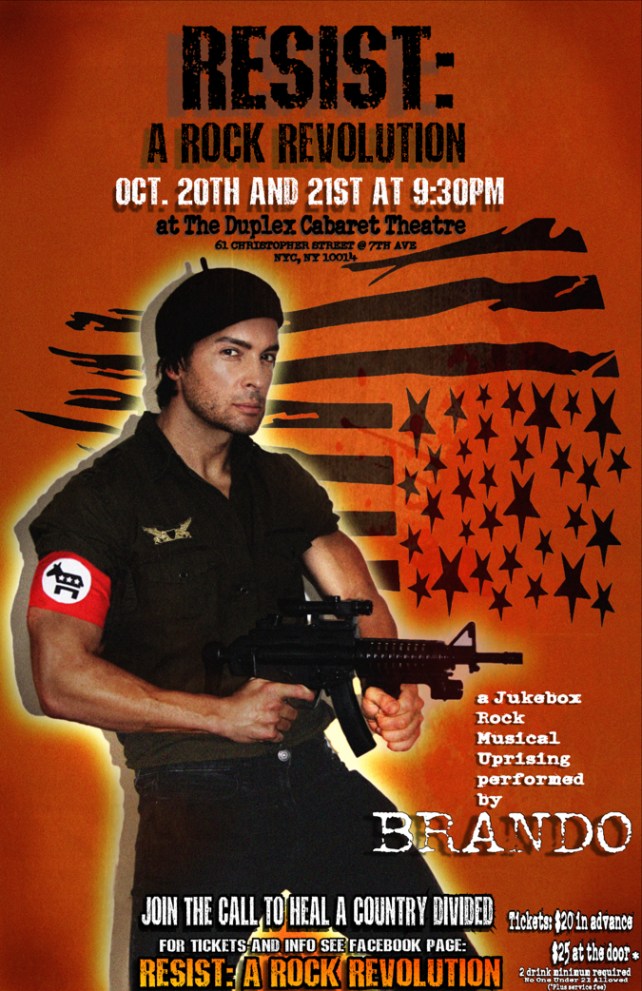
Key art for “Resist: A Rock Revolution”
Backstage
Eventually, Straka, a lifelong Democrat, figured out the time-honored strategy of getting noticed: He switched sides. In 2018, with help from his friend, the gay anti-trans activist Mike Harlow, he made a Facebook video declaring that he was “walking away” from the Democratic Party.
“Once upon a time, I was a liberal,” Straka says in the dramatic six-minute video. “For years now, I have watched as the left has devolved into intolerant, inflexible, illogical, hateful, misguided, ill-informed, un-American, hypocritical, menacing, callous, ignorant, narrow-minded and, at times, blatantly fascistic behavior and rhetoric…So I am walking away, and I encourage all of you to do the same.”
About a month later, the #WalkAway hashtag took off, with some help from Russian propaganda outlets like RT, which did some of the first news segments about his video. Donald Trump Jr. and other MAGA luminaries used the hashtag in tweets, and Straka’s video eventually tallied up more than 2 million views on Facebook and YouTube.
Hundreds of people took to Facebook to record their own #WalkAway stories as evidence that traditional Democratic constituencies—minorities and LGBT folks—were following Straka’s lead. But his core audience appeared to be the usual MAGA types (including “Anthony Devolder”—i.e., George Santos, who, before running for Congress, declared Straka “an idol to all of us” at a 2019 #WalkAway event in New York City). As Karlyn Borysenko, a 2022 libertarian candidate for New Hampshire governor who once worked with Straka’s group explained in a September tweet, “Most of the people in #WalkAway aren’t ex-Democrats. They’re conservatives who’ve always been conservative. They’re called ‘Walk Withs.’”
Almost immediately after his political conversion, Straka connected with fringe far-right extremists, many of whom would become key players in the effort to overturn the 2020 election results. When he inevitably started a GoFundMe to kickstart his campaign, one of its biggest early donations came from far-right conspiracy theorist and Infowars mogul Alex Jones, who chipped in $10,000. The fund ultimately raised almost $327,000. In late 2018, Straka formalized his fundraising by creating the #WalkAway Foundation, which raised nearly $2 million in 2020. Of that, $100,000 came from the #FightBack Foundation, which was co-founded by the lawyer L. Lin Wood, who helped Trump challenge the 2020 election results in court. (The federal government also gave Straka and the #WalkAway Foundation more than $30,000 in Covid relief loans that were forgiven.)
When Straka held his first #WalkAway march in DC in October 2018, one of the speakers was Owen Shroyer, the InfoWars host who was later sentenced to 60 days in prison for unlawfully entering and remaining on the Capitol grounds on January 6. And the 1st Amendment Praetorian militia—a group of former military members close to former Trump National Security Adviser Michael Flynn—got its start by providing security at Straka’s events.
Straka eventually caught the attention of Trump’s daughter-in-law Lara Trump, who was working to woo people of color and LGBT people to counter attacks on Trump’s discriminatory agenda. She interviewed him in 2019 at Trump Tower for a video featured on the campaign’s Facebook page, which the president then promoted to his millions of followers.
Subsequently, by the summer of 2019, Straka was firmly affixed to the Trump campaign. He was part of the White House “pundit prep” operation, which supplied him with pro-Trump talking points to include in his public speaking events. And in August 2019, he opened for Trump at a rally in Cincinnati. His speech attracted national attention—but not because of his #WalkAway message. Hours before the rally, news broke that in an intelligence briefing, the FBI had flagged the growing QAnon presence in the MAGA movement as a potential vector for violence.
QAnon followers adhere to a convoluted conspiracy theory that claimed Trump was engaged in a global battle against satanic Democratic pedophile rings. The Capitol rioters included many believers, including Ashli Babbitt, who was killed by Capitol police as she tried to climb through a shattered window into the Speaker’s Lobby.
People sporting QAnon gear had been increasingly spotted during campaign rallies. At that point, Trump had never directly addressed these fans, but Straka did, concluding his speech with the QAnon rallying cry: “Where we go one, we go all.”
Straka denied invoking the conspiracy. “I was not making any references to QAnon whatsoever,” he told Talking Points Memo. “Obviously I’m disappointed that the media has chosen to focus on this.” His denial, however, rang hollow. One of the #WalkAway Foundation’s first and current board members is Tracy “Beanz” Diaz, a former Republican operative and an early and prominent QAnon promoter. (Straka told me he has never been a QAnon supporter and does not fully understand the movement. “I just liked the phrase,” he said.)
Straka’s connection with Trump supercharged his social media following. In late November 2020, the New York Times reported on new research identifying Straka as one of a small group of conservative social media personalities who were “superspreaders” of misinformation about election fraud. His “Stop the Steal” social media posts rivaled Eric Trump’s as the most trafficked interactions between mid-October and the two weeks after the November election. By the time he joined the mob at the Capitol, he had more than 600,000 Twitter followers, and his #WalkAway Campaign Facebook group had more than half a million members.
“I certainly don’t consider myself a superspreader of misinformation,” Straka told me. He said the “Stop the Steal” hashtag was simply a way of sharing information about the election, which he and many people believed was plagued with “suspicious activity” driven by hatred of Donald Trump. “My goal, and I think most people’s goal, was always to learn the truth,” he said.

After Trump’s early 2020 lead in Michigan vaporized with the counting of mail-in ballots, Straka helped promote a “Stop the Steal” rally in Detroit outside the convention center, where election workers still were counting votes. He riled up protesters with an expletive-laden speech. “I voted for that stupid bitch Hillary Clinton in 2016,” he yelled through a bullhorn. “I voted for the greatest president in my lifetime in 2020, Donald J. Trump…People are out of their fucking minds if they think we’re going to sit back quietly and allow them to steal this election.”
From Detroit, he moved on to Georgia, joining Alex Jones and other Stop the Steal luminaries who had organized “Stop the Steal” rallies in late November after Secretary of State Brad Raffensperger certified the election for Biden. Straka led a protest in front of the CNN headquarters in Atlanta.
In early December, his tweets grew increasingly inflammatory: “We can not allow a transition to Biden under these circumstances,” read one; “we are in a civil war,” said another. On January 5, 2021, Straka was in Washington, speaking at a rally at Freedom Plaza with dozens of election deniers, including Roger Stone and MyPillow Guy Mike Lindell. “Patriots! Welcome to the revolution!” he shouted, as if he were back in his musical, “Resist: A Rock Revolution.”
The next morning, when Trump spoke at the Ellipse, Straka was front and center in the VIP section along with Michael Flynn and Black conservative influencer (and #WalkAway Campaign regular) David Harris Jr. Afterwards, Straka was scheduled to speak near the Capitol at the “Wild Protest” organized by Stop the Steal instigator Ali Alexander, but after Trump encouraged the rally attendees to march on the Capitol, the speech got canceled. So Straka and Harris walked to the Willard Hotel, where they were staying. (Federal Election Commission records show that his #WalkAway Campaign PAC paid the Willard Hotel almost $3,000.) The Willard is also where Steve Bannon, Roger Stone, and other Stop the Steal organizers had set up their “war room,” which became the subject of intense focus by the House January 6 investigation.
At a November 2023 #WalkAway event, Harris said that on January 6, he saw what was happening at the Capitol on the TV in his hotel room and his wife insisted he stay put. Straka, however, got on the Metro and headed into the fray. Prosecutors produced messages showing that Straka was informed about the Capitol breach, but he went there anyway.
When he arrived at the east side of the Capitol, according to court documents, he pushed his way up the steps toward the massive bronze Columbus Doors that open into the Rotunda. Straka’s video of those moments does not show a peaceful protest. Alarms were going off and police officers were trying to repel the angry crowd, which included Proud Boys leader Joe Biggs, who in August was sentenced to 17 years in prison for seditious conspiracy. You can hear people on the video talking about plans to “take a shit” in Nancy Pelosi’s office as they try to push towards the door. It shows rioters seizing the officer’s shield. Two guys directly in front of Straka are wearing combat helmets, goggles, and full-face gas masks—ready for war.
Prosecutors said the only reason Straka didn’t go inside the Capitol was that he got tear gassed near the East Rotunda door. “I was quite close to entering myself as police began tear gassing us from the door,” Straka tweeted afterwards to his hundreds of thousands of followers. “I inhaled tear gas and got it in my eyes.”
The House January 6 committee obtained text messages showing that, in the midst of the chaos, Michael Coudrey, one of the Stop the Steal movement leaders, texted a group chat that included Straka, recommending they leave the Capitol. “Fuck no!!” Straka responded, “I’m at the Capitol and just joined the breach!!! I just got gassed! Never felt so fucking alive in my life!!!”
(Those memories have apparently dimmed over time. Fast forward to July 2023, and Straka is on Twitter saying, “One of the hundreds of lies the government told was that I didn’t enter [the Capitol] because I got gassed… I did not get gassed.”)
Eventually, the crowd started to leave the East Rotunda, and Straka returned to the Willard, where he tweeted encouragement to others still at the building. “Patriots at the Capitol – HOLD. THE. LINE!!!!” He also batted down suggestions that Antifa had caused the riot. “I’m completely confused. For 6-8 weeks everybody on the right has been saying ‘1776!’ & that if congress moves forward it will mean a revolution! So congress moves forward. Patriots storm the Capitol,” he tweeted, “now everybody is virtual [sic] signaling their embarrassment that this happened.”
His bravado quickly evaporated. Records obtained by the House January 6 committee showed that, like so many J6 participants, Straka started erasing his social media history, and his conversations with other Stop the Steal activists moved to encrypted channels on Signal. But the former liberal had alienated a lot of people close to him with his transformation to MAGA mouthpiece. According to an affidavit in his case, at least one family member reported him to the FBI which, on January 25, 2021, burst into his Omaha apartment and arrested him.
For a while, it looked like Straka’s influencer days were over. Facebook took his #WalkAway page down. PayPal and other mainstream payment platforms he used to solicit donations dumped him, as did his spam email providers like Constant Contact and MailChimp. In 2021, his foundation raised only $463,000, a fraction of the previous year (though it still paid Straka $121,000). He claims his landlord evicted him because of all the media coverage and that he was put on a terrorist watchlist so that he was tied up in airport security for hours for extra screening. (TSA may have other reasons for scrutinizing Straka at the airport: In 2020, when he was en route to a Trump rally, American Airlines booted him off a flight for refusing to wear a mask and banned him from the airline until the mask requirement was lifted. Naturally, he posted a video of the skirmish online.)
Congressional Republicans initially condemned the January 6 events and sought to distance themselves from the people involved. House Democrats created a committee to investigate, holding their first hearing in the summer of 2021. For a brief moment, it looked as though the country was united in its condemnation of the Capitol riot. But, as Rep. Jamie Raskin (D-Md.), who served on the House Select Committee investigating the events of January 6, told me, “The effort to whitewash the violence and recast an insurrection against the Constitution as a peaceful demonstration began at the very inception.”
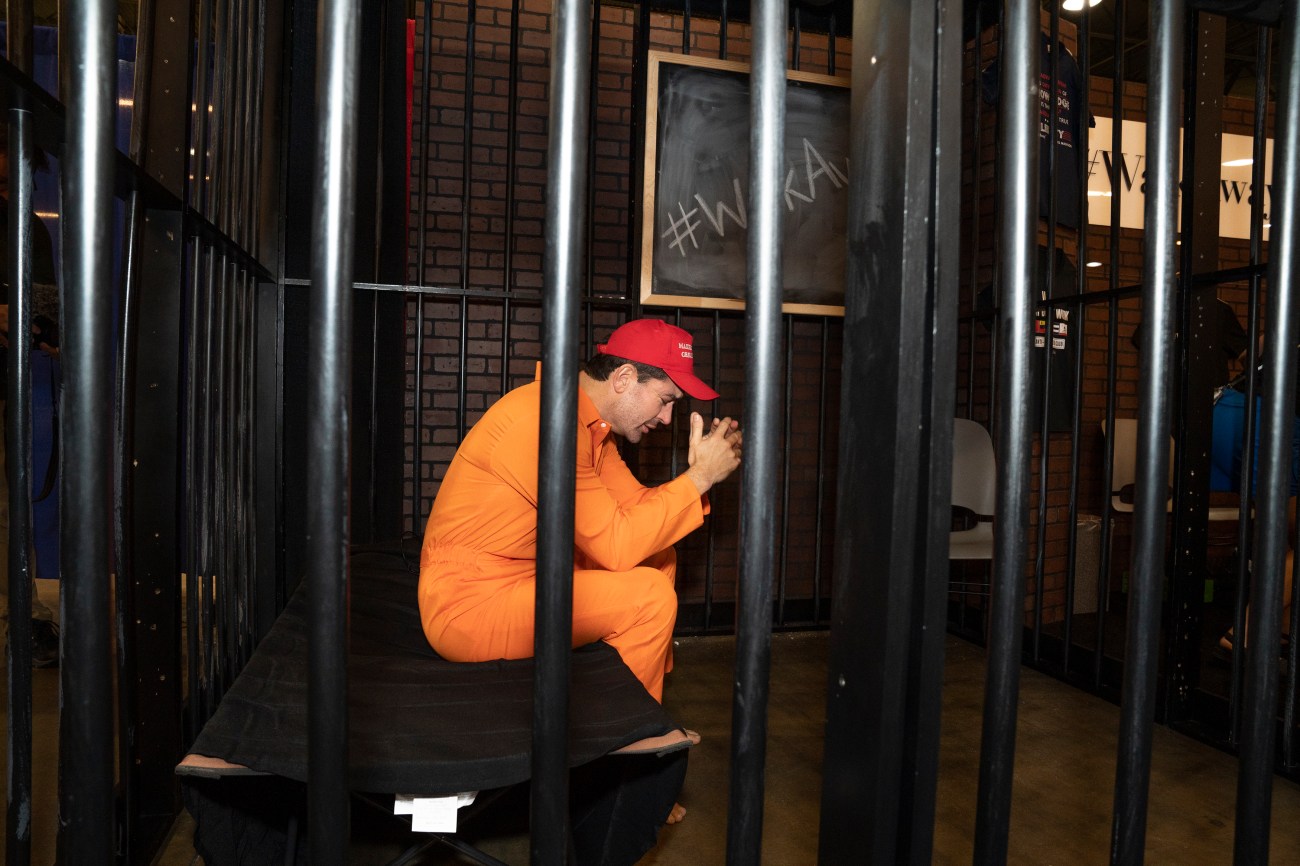
Right-wing activist Brandon Straka recreate jail cell at CPAC Texas 2022 conference at Hilton Anatole in Dallas on August 5, 2022.
Lev Radin/Sipa/AP

Donald Trump first floated the idea of mass pardons for the J6ers in January 2022, just a week after Straka was sentenced. “If I run and I win, we will treat those people from Jan. 6 fairly,” he said at a rally outside Houston. “And if it requires pardons, we will give them pardons, because they are being treated so unfairly.”
Just as federal judges were trying to hold people like Straka accountable for their actions, Trump was turning them into martyrs. Straka would be at the vanguard of that effort. He was still in home detention in Nebraska when, a few days after Trump’s pledge, he told the Washington Examiner, “I had a huge following, and they thought I needed to be taught a lesson through deterrence. They took a well-known conservative public figure and made him disappear for an entire year, and now I’m back.”
Once he finished home detention in April, Straka began reviving his influencer career, only this time as a champion of justice for his fellow defendants. He dove into raising money for the WalkAway political action committee, amassing nearly $300,000 for the 2022 election cycle—none of which was actually spent on candidates or elections, according to federal election records. (Some of the PACs biggest expenditures were for hotel and airfare expenses.) He campaigned for other “Big Lie” candidates like Kari Lake, who lost the 2022 Arizona governor’s race.
Telegenic and charming, Straka was the perfect spokesman for the insurrectionists. His case highlighted many of the legitimate issues liberal criminal justice reformers have been criticizing for years, like coercive plea bargains and overzealous FBI investigations. And he sounds so reasonable when he argues that he was prosecuted for his political views. “The things I was accused of by the DOJ were clearly grossly exaggerated,” he told me, calling it “theatrical nonsense.”
“I’m not a rioter. I’m certainly not an insurrectionist. I’m certainly not a terrorist,” he said. Even the worst of the disorderly conduct allegations against him, he said, were just about “words”—meaning tweets he sent before and after the riot, or his yelling “Go! Go!” at other rioters. None of that, he thinks, merits the suffering he’s endured since his arrest. He’s not alone in that view. As NBC reporter Ryan Reilly acknowledges in his new book, Sedition Hunters, “[Had] it not been for his public profile, Straka probably would not have been charged.”
The right-wing media ecosystem, with its well-funded convention circuit and influential propaganda outlets, loves nothing better than a conservative persecution story. It happily amplified Straka’s version of January 6. One of his first big interviews after leaving home detention was on Tucker Carlson’s Fox Nation show. Straka had sworn under oath as part of his plea agreement that he yelled “take it!” to rioters grabbing a shield from police. But he told Carlson the voice on his video saying “take it!” wasn’t his. “I vehemently denied that was my voice, to my attorney,” Straka said, explaining that he only “confessed” to those things to resolve the case.
In true Trumpian fashion, Straka also went after his critics in the media. In December 2022, he filed a lawsuit against MSNBC and hosts Chris Hayes and Ari Melber, alleging that they had defamed him by suggesting on air that he had “storm[ed] the Capitol” and that he’d egged on the mob to take a police officer’s shield. Straka’s suit claimed that because of MSNBC’s reporting, he was subjected to harassment and threats and his media invitations had dried up. It accused the network anchors of deliberately trying to end Straka’s influencer career. He demanded $25 million in compensation.
US District Court Judge Joseph Bataillon was not persuaded. Straka had admitted in his plea deal that he knew he was illegally on the Capitol grounds on January 6. “Whatever differences there are between statements that Straka committed the federal crime of storming the Capitol and the conduct that forms the basis of his plea amount to semantic hair splitting,” he wrote in his August order throwing out the case.
Even with all Straka’s activism, the campaign to rebrand insurrectionists as persecuted protesters didn’t initially take off. “For a long time, I was really the only person out there talking,” Straka told me. At first, Republican members of Congress wanted to pretend as if the riot had never happened. It didn’t help that some of the most prominent J6 activists were in fact guilty of violence. Shane Jenkins, for instance, started the website “The Real J6” where he portrayed himself as just another peaceful protester. “I went to the Capitol on January 6th to voice my 1st amendment right as an American citizen & support President DJT,” he wrote on the site, leaving out the fact that, according to court documents, he’d smashed a window at the Capitol with a tomahawk. (In October, he was sentenced to seven years in prison.)
But Straka continued to push the GOP establishment towards Trump’s view of the rioters as victims rather than perpetrators. In August 2022, he appeared at the Conservative Political Action Convention in Dallas on a panel with Rep. Andy Biggs (R-Ariz.) called “You’re Next: The Rise of the Democrat Gulag,” where he bemoaned the “silence on the right” about the injustices suffered by J6 defendants. Biggs, who described the prosecutions as “Soviet,” appeared at a loss when Straka pointedly asked him: “What are you guys going to do about it?”
During the conference, Straka also engaged in a little performance art in the exhibit hall. Dressed in an orange jumpsuit and a red MAGA cap, he sat weeping in the replica of a jail cell. Rep. Marjorie Taylor Greene (R-Ga.) stopped by to pray with him, ensuring a flurry of media coverage. The publicity seems to have paid off. In 2022, the #WalkAway Foundation raised more than $600,000, a jump of more than 30 percent over the previous year, according to the group’s most recent IRS filing.
In early 2023, Straka rented a room at CPAC in DC for a panel discussion, “True Stories of January 6: The Prosecuted Speak.” Joining him were two prominent right-wing conference characters: Simone Gold, the anti-vax doctor and lawyer who was sentenced to 60 days in prison for entering the Capitol on January 6 and John Strand, her alleged boyfriend, who is now serving a 32-month sentence for the same thing. Also on the panel was a former West Virginia legislator who livestreamed himself inside the Capitol yelling “Derrick Evans is in the Capitol!” (Evans ended up being sentenced to 90 days in prison as a result.) Before a standing room only crowd, Straka wept convincingly as he described the two days he spent in jail after getting arrested.
From there, he moved on to a college tour and more rallies. Straka relentlessly pushed his version of events on social media and to conservative outlets. And over the last two years, January 6 has gone from a Republican embarrassment to a cause célèbre. In May, Florida Governor Ron DeSantis joined Trump in promising to pardon those who’d been unfairly punished by the Justice Department. In June, Rep. Matt Gaetz (R-Fla.) invited Straka to return to the Capitol, this time to testify at a field hearing on the “weaponization of government” in relation to “unjust prosecutions of January 6th, 2021.”
In his testimony, Straka catalogued the injustices he’d suffered since being arrested, not the least of which was TSA canceling his pre-check. The hearing was evidence of how much the narrative on the right had shifted towards Straka’s point of view of January 6.
“Did I have a part of that?” asks Straka. “I believe that I probably did.”

Straka’s rehab tour may have helped to reframe the public’s view of the insurrection, but it wasn’t entirely unnoticed by the authorities who’d punished him. In August 2022, US District Judge Dabney L. Friedrich raised the issue during a hearing on the accidental release of a sealed document in Straka’s case. “It’s also been brought to my attention that Mr. Straka has been making questionable comments regarding the truth of his plea,” Friedrich said. “It makes me question every statement he made to me at the time of sentencing, every single one of them.”
She asked his lawyer, Bilal Essayli, if Straka wanted to withdraw his plea and come back to court for an evidentiary hearing to address the claims he was making on TV and elsewhere. “No, your honor,” Essayli replied. The judge said Straka “needs to understand that he faces exposure for making false statements to federal law enforcement officers. I suggest that you tell him to exercise some discretion that he didn’t show before January 6, during January 6, and apparently after January 6.”
Judges and prosecutors alike have been frustrated by some of the J6ers’ post-sentencing behavior. The day after Derrick Evans expressed remorse in his sentencing hearing, he went on a West Virginia radio show to disown it all. “I’m never going to regret standing up to tyranny and standing up for the people who believe in me and standing up for the future of my children,” he said when asked if he regretted going to the Capitol. Prosecutors filed a futile memo of protest with the judge citing the radio interview and noting, “The speed and degree of Evan’s about-face warrants this.” Evans regularly appears in public events with Straka and is now running for Congress.
As the prosecutors conceded in Evans’ case, once people have been sentenced, there’s not much the legal system can do to hold them accountable for their rhetoric. “This is America,” says Dan Richman, a former federal prosecutor who now teaches at Columbia law school. “You get to lie to the public.”
Straka’s reemergence as an influencer highlights the court system’s difficulty in punishing individual rioters without treading on their free speech rights. “In our system of laws, we punish people for their conduct and not for their politics,” Rep. Jamie Raskin told me. While not referring to Straka specifically, he explained, “A lot of the most extreme authoritarian zealots were guilty of relatively minor offenses. They were not necessarily the most daring insurrectionists. A number of those people have been able to weasel their way through court and get off with relatively light sentences and then go right back to the polemical wars against American democracy.”
For Robert Pape, director of the Chicago Project on Security and Threats, much of the problem is rooted in the fact that “we don’t have a criminal code for inciting insurrection. [The legal system] just isn’t set up to deal with ‘Yeah, I stormed the Capitol to threaten members of Congress to overturn the election.’”
Instead, he says, judges are viewing the individual cases narrowly, sticking to the federal sentencing guidelines, which don’t consider whether someone spent the weeks after the election trying to convince people to start a civil war. And, of course, most of the defendants are white, middle-class people who often get off lightly in court. “If that had been a group of 2000 ISIS supporters that had broken into the Capitol,” Pape asks, “do you think we’d only be prosecuting them for trespassing?”

Last April, on the day Trump was indicted in New York for falsifying business records, Straka was outside Mar-a-Lago with other Trump fans who’d gathered to show their support for the ex-president. Across the road, a single counter-protester, lawyer Victoria Doyle, held a sign that read: “Fuck around, find out. Nation of laws, not men.”
Straka took the opportunity to “interview” her, claiming to be a journalist. Doyle, who had no idea who he was, told me she eventually tried to walk away. “Straka got in my face and was just hurling invective and questions at me: ‘You call yourself a lawyer? Did you pass the bar?’”
Straka posted the video on Twitter and Truth Social. Then the Gateway Pundit, a notorious source of hoaxes and conspiracy theories, reposted the footage, which included Doyle’s name and the webpage from her law firm. Social media users responded by circulating her email address and work phone number. In response, Doyle was inundated with threatening messages. “What’s up cunt?” said one caller from Tennessee. “I’m gonna call your office every day.”
When Doyle learned that the person responsible for her doxing was still on probation for a January 6th related charge, she wrote prosecutors to complain. “He’s all but disavowed his plea agreement and his confession,” she told me. “It’s outrageous. He’s turning the justice system upside down.” (Straka says he was unaware of the abuse Doyle suffered but notes unsympathetically that this is what happens if you “leave your house to troll Trump supporters.”)
As Doyle discovered, while liberals have largely been fighting the insurrectionists in government institutions, like Congress or the courthouse, the MAGA world has turned January 6th into one more front in the culture war. And as a former actor, Straka is exquisitely well equipped for that battle.
Today, there are TV shows, movies, and at least one docudrama produced by Dinesh D’Souza, all recasting January 6 prosecutions as a deep state conspiracy to criminalize Trump supporters for their political beliefs. Straka has made cameos in many of them. Meanwhile, none of the hundreds of court proceedings against J6ers have even been televised because federal rules ban cameras in the courtroom.
“A lot of people thought if you just throw them in jail or you just prosecute them, then justice will be served and we’re done with this. But that’s not true,” says Danielle Tomson, a researcher working on a book about conservative influencers. “Even once they get out of jail, they can continue to spin their own counterfactual when everyone else has moved on.”
Doyle did find a way to fight back. In August 2023, Straka filed a cheeky motion asking the judge to reduce his probation for good behavior. Prosecutors included Doyle’s letter with a motion opposing it, along with two others from people documenting his public rhetoric that conflicted with what he admitted to in court. “[H]e has continued to use social media to belittle the severity of his plea and the pleas of other rioters,” prosecutors wrote.
The judge agreed, writing, “Although the defendant has a First Amendment right to make public statements, his minimizing of his and others’ unlawful acts on January 6 evinces a continued lack of remorse and an ongoing need to protect the public from future crimes.” Straka will remain on probation until January 2025.

Panel with Jeffrey Lord, Brandon Straka, Andy Biggs, Kash Patel during CPAC Texas 2022 conference at Hilton Anatole in Dallas on August 5, 2022.
Lev Radin/Sipa/AP

“Nobody worked harder for President Trump than I did” in the last election, Straka bragged at CPAC in 2022. But he told me in December that he has no immediate plans to get involved in the 2024 campaign. It’s hard to imagine he will resist the siren song of the Trump campaign and its associated publicity and fundraising opportunities, however. Trump, after all, has turned Straka’s crusade into his own.
Tomson attended Trump’s speech before the New York Young Republican Club in December and was struck by how much the January 6 prosecutions infused it. A lot of the rhetoric that night, she says, was about, “If we don’t win, we’re going to jail.” Rep. Matt Gaetz, one of Trump’s most sycophantic supporters, even joked that he and Trump and other MAGA Republicans were going to be known as “Cellblock A” if Trump didn’t get elected. In the face of his many indictments, Tomson says, Trump has been able to point to J6ers as proof that “If they can do it to me, they can do it to you.”
In November, Straka, who had spoken at dozens of right-wing confabs, decided to hold one of his own called “Walk-a-Con.” For three days, he and about 600 of his fans hung out in an airport hotel in West Palm Beach near Mar-A-Lago and heard from B-list MAGA stars like Rudy Giuliani and Lara Trump. The marquis event was titled, “Disorderly Conduct: The roast of Brandon Straka,” in which a lineup of MAGA celebrities trash-talked Straka, who sat on a throne wearing a sequined jacket.
One of the roasters was Shawn Farash, a guy who makes a living impersonating Donald Trump. Straka told the small crowd that he really admired Farash because, “I think he represents the very best of what it means to be MAGA: making as much money as you can hanging off Donald Trump until he goes to prison.”
Straka may have inadvertently said the quiet part out loud, explaining why the big election lie and the revisionist history of January 6th persists. As long as there is money and clicks to be had, even 1,200 prosecutions seem unlikely to change that. I recently asked Straka whether he thought Biden had been legitimately elected. “I don’t think about it anymore,” he replied. “I just look forward. There’s another election next year. I’m much more interested in that.”
Images from left: Tayfun Coskun/Anadolu Agency/Getty; Willy Sanjuan/Invision/AP, John Rudoff/Sipa/AP, Lev Radin/Sipa/AP, Andrew Harnik/AP; Selcuk Acar/NurPhoto/Zuma
